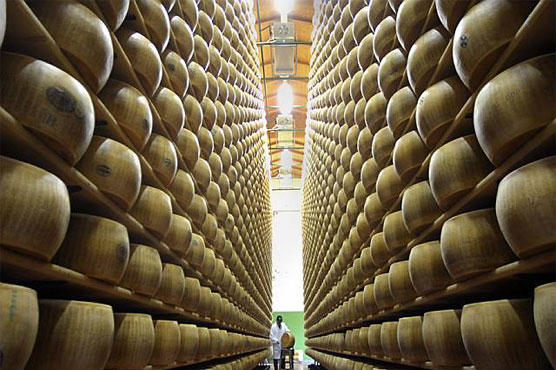Italian bank accepts Parmesan cheese as collateral for loans

Italian bank accepts Parmesan cheese as collateral for loans
(Web Desk) – There is a bank that doesn’t want your house, car, or any other property as security. What does it want instead? Cheese! Yes, that’s true.

There is a bank out there that accepts wheels of cheese as collateral and not just any cheese only the authentic Italian high quality Parmesan produced by local farmers in one particular part of Italy.

Credito Emiliano or CredEm for short is an Italian bank in the Emilia-Romagna region that takes the love and appreciation for food and traditions to the next level.
In 1953, the bank executives decided to start accepting giant Parmegiano Regiano wheels as security from local farmers seeking small business loans.
It’s an excellent arrangement due to the nature of cheese production. Typically, it takes between 18 to 36 months for the Parmesan cheese to age, which is when the cheesemakers deliver it to the buyers and receive payment for their work.
However, not every business owner can wait up to 36 months to get paid many of them need money faster to supplement cash flow.
This is why, when the bank steps in and offers a “Parmesan loan,” it helps farmers stay in business.
Credito Emiliano holds a significant amount of Parmesan cheese at their facilities.
According to an interview back in April 2017, the bank typically stores more than 300,000 wheels of cheese.
At that point, it was valued at over 160 million euros (more than 142 million US dollars using the exchange rate from 2017).
That is a lot of cheese! Certainly more than any of us can consume at a family dinner.
The bank doesn’t keep Parmesan in a vault together with other valuables.
They built a special warehouse where the cheese is stored, and a special team and the bank manager take care of Parmesan from the moment it gets to the warehouse until it’s returned to the farmer between 1.5 to 3 years later.
The bank manager says they “protect the producer’s investment” and calls this concept “from cow to the bank”
How Do These Loans Work?
Let’s try to imagine how a typical process would look like for Giuseppe, a local farmer, based on what we know.
Giuseppe has had a small business producing Parmegiano Regiano for a long time — in fact; it’s a generational business. But the cash flow is tight, which is why the farmer urgently needs a loan from the bank.
Giuseppe has a meeting at CredEm and asks for a loan. He gets approved for the amount he requested, under the condition that he surrenders a certain number of cheese wheels to the bank. Guiseppe accepts those terms.
Now, the farmer has the financial means to run his operations.
He has enough funds to feed the cows, pay workers to milk those cows, and then make the cheese. Once Parmesan is ready, a representative from the bank collects it — or maybe Guiseppe delivers it himself.
We can’t be certain on such specifics, as arrangements may vary. Either way, Parmesan is safely delivered to the bank’s warehouse, where a dedicated team takes care of it for up to 36 months.
Guiseppe repays the loan. Once the term is up, and the cheese is aged, the bank releases the collateral.
Guiseppe’s distributors get the cheese to sell, and the farmer continues his operations. Everyone is happy, especially those of us who get to sprinkle Parmesan on pasta.

Why is Parmesan so Valuable?
Parmesan cheese can only be produced in one region of Italy: Emilia-Romagna.
There are five cities where this culinary marvel is made exclusively: Parma, Reggio Emilia, Modena, Bologna and Mantova. That’s it, no exceptions!
It takes a lot of milk to produce one wheel of Parmegiano Regiano cheese — 131 gallons on average.
A wheel of Parmesan cheese can cost over $1,000, and since it typically weighs 88 pounds, it comes out to $11 per 1 pound.
Each year, the farmers produce around 3.6 million cheese wheels, which values the industry at 2.5 billion US dollars (or 2.2 billion euros).
Evidently, people around the world love and appreciate Italian cheese!
According to WorldExport.com, the cheese industry amounted to 3.5 billion US dollars in 2019.
If Parmesan takes up around 2.5 billion yearly, it means this majestic cheese represents the lion’s share of the country’s cheese export.
Back in 2019, cheese was in the 24th place on the list of Italy’s exports, with wine taking spot
Some of us don’t have the best experience with banks. But it’s heart-warming to hear stories about banks supporting local small businesses, especially when they accept delicious food as security.

